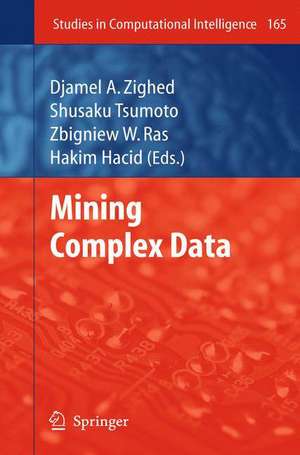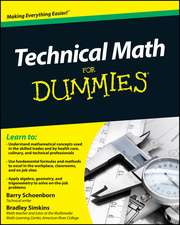Mining Complex Data: Studies in Computational Intelligence, cartea 165
Editat de Djamel A. Zighed, Shusaku Tsumoto, Zbigniew W. Ras, Hakim Haciden Limba Engleză Hardback – 13 oct 2008
| Toate formatele și edițiile | Preț | Express |
|---|---|---|
| Paperback (1) | 1217.75 lei 6-8 săpt. | |
| Springer Berlin, Heidelberg – 28 oct 2010 | 1217.75 lei 6-8 săpt. | |
| Hardback (1) | 1222.01 lei 6-8 săpt. | |
| Springer Berlin, Heidelberg – 13 oct 2008 | 1222.01 lei 6-8 săpt. |
Din seria Studies in Computational Intelligence
- 20%
 Preț: 449.37 lei
Preț: 449.37 lei - 20%
 Preț: 1158.26 lei
Preț: 1158.26 lei - 20%
 Preț: 986.66 lei
Preț: 986.66 lei - 20%
 Preț: 1452.76 lei
Preț: 1452.76 lei - 20%
 Preț: 168.78 lei
Preț: 168.78 lei - 20%
 Preț: 1291.10 lei
Preț: 1291.10 lei - 18%
 Preț: 1112.30 lei
Preț: 1112.30 lei - 20%
 Preț: 565.39 lei
Preț: 565.39 lei - 20%
 Preț: 649.28 lei
Preț: 649.28 lei - 20%
 Preț: 1047.73 lei
Preț: 1047.73 lei - 20%
 Preț: 1578.96 lei
Preț: 1578.96 lei - 20%
 Preț: 643.50 lei
Preț: 643.50 lei - 20%
 Preț: 657.49 lei
Preț: 657.49 lei - 20%
 Preț: 993.28 lei
Preț: 993.28 lei - 20%
 Preț: 990.80 lei
Preț: 990.80 lei - 20%
 Preț: 989.96 lei
Preț: 989.96 lei - 20%
 Preț: 1165.69 lei
Preț: 1165.69 lei - 20%
 Preț: 1444.52 lei
Preț: 1444.52 lei - 20%
 Preț: 1041.96 lei
Preț: 1041.96 lei - 20%
 Preț: 1047.73 lei
Preț: 1047.73 lei - 20%
 Preț: 1046.06 lei
Preț: 1046.06 lei - 18%
 Preț: 2500.50 lei
Preț: 2500.50 lei - 20%
 Preț: 989.13 lei
Preț: 989.13 lei - 20%
 Preț: 1165.69 lei
Preț: 1165.69 lei - 20%
 Preț: 1164.05 lei
Preț: 1164.05 lei - 20%
 Preț: 1042.79 lei
Preț: 1042.79 lei - 20%
 Preț: 1460.19 lei
Preț: 1460.19 lei - 18%
 Preț: 1403.52 lei
Preț: 1403.52 lei - 18%
 Preț: 1124.92 lei
Preț: 1124.92 lei - 20%
 Preț: 1039.47 lei
Preț: 1039.47 lei - 20%
 Preț: 1008.11 lei
Preț: 1008.11 lei - 20%
 Preț: 1045.25 lei
Preț: 1045.25 lei - 20%
 Preț: 1275.42 lei
Preț: 1275.42 lei - 20%
 Preț: 1040.32 lei
Preț: 1040.32 lei - 20%
 Preț: 988.32 lei
Preț: 988.32 lei - 20%
 Preț: 1169.79 lei
Preț: 1169.79 lei - 20%
 Preț: 1162.37 lei
Preț: 1162.37 lei - 20%
 Preț: 1059.26 lei
Preț: 1059.26 lei - 20%
 Preț: 1164.05 lei
Preț: 1164.05 lei - 20%
 Preț: 1166.52 lei
Preț: 1166.52 lei - 20%
 Preț: 1459.38 lei
Preț: 1459.38 lei - 18%
 Preț: 1005.74 lei
Preț: 1005.74 lei - 20%
 Preț: 997.38 lei
Preț: 997.38 lei - 20%
 Preț: 1055.94 lei
Preț: 1055.94 lei - 20%
 Preț: 1284.47 lei
Preț: 1284.47 lei - 20%
 Preț: 994.08 lei
Preț: 994.08 lei - 20%
 Preț: 1048.72 lei
Preț: 1048.72 lei - 20%
 Preț: 1066.02 lei
Preț: 1066.02 lei - 20%
 Preț: 943.78 lei
Preț: 943.78 lei - 20%
 Preț: 1173.10 lei
Preț: 1173.10 lei
Preț: 1222.01 lei
Preț vechi: 1490.25 lei
-18% Nou
Puncte Express: 1833
Preț estimativ în valută:
233.86€ • 253.94$ • 196.44£
233.86€ • 253.94$ • 196.44£
Carte tipărită la comandă
Livrare economică 22 aprilie-06 mai
Preluare comenzi: 021 569.72.76
Specificații
ISBN-13: 9783540880660
ISBN-10: 3540880666
Pagini: 316
Ilustrații: XII, 302 p. 114 illus.
Dimensiuni: 155 x 235 x 28 mm
Greutate: 0.57 kg
Ediția:2009
Editura: Springer Berlin, Heidelberg
Colecția Springer
Seria Studies in Computational Intelligence
Locul publicării:Berlin, Heidelberg, Germany
ISBN-10: 3540880666
Pagini: 316
Ilustrații: XII, 302 p. 114 illus.
Dimensiuni: 155 x 235 x 28 mm
Greutate: 0.57 kg
Ediția:2009
Editura: Springer Berlin, Heidelberg
Colecția Springer
Seria Studies in Computational Intelligence
Locul publicării:Berlin, Heidelberg, Germany
Public țintă
ResearchCuprins
General Aspects of Complex Data.- Using Layout Data for the Analysis of Scientific Literature.- Extracting a Fuzzy System by Using Genetic Algorithms for Imbalanced Datasets Classification: Application on Down’s Syndrome Detection.- A Hybrid Approach of Boosting Against Noisy Data.- Dealing with Missing Values in a Probabilistic Decision Tree during Classification.- Kernel-Based Algorithms and Visualization for Interval Data Mining.- Rules Extraction.- Evaluating Learning Algorithms Composed by a Constructive Meta-learning Scheme for a Rule Evaluation Support Method.- Mining Statistical Association Rules to Select the Most Relevant Medical Image Features.- From Sequence Mining to Multidimensional Sequence Mining.- Tree-Based Algorithms for Action Rules Discovery.- Graph Data Mining.- Indexing Structure for Graph-Structured Data.- Full Perfect Extension Pruning for Frequent Subgraph Mining.- Parallel Algorithm for Enumerating Maximal Cliques in Complex Network.- Community Finding of Scale-Free Network: Algorithm and Evaluation Criterion.- The k-Dense Method to Extract Communities from Complex Networks.- Data Clustering.- Efficient Clustering for Orders.- Exploring Validity Indices for Clustering Textual Data.
Textul de pe ultima copertă
The aim of this book is to gather the most recent works that address issues related to the concept of mining complex data. The whole knowledge discovery process being involved, our goal is to provide researchers dealing with each step of this process by key entries. Actually, managing complex data within the KDD process implies to work on every step, starting from the pre-processing (e.g. structuring and organizing) to the visualization and interpretation (e.g. sorting or filtering) of the results, via the data mining methods themselves (e.g. classification, clustering, frequent patterns extraction, etc.). The papers presented here are selected from the workshop papers held yearly since 2006.
The book is composed of four parts and a total of sixteen chapters. Part I gives a general view of complex data mining by illustrating some situations and the related complexity. It contains five chapters. Chapter 1 illustrates the problem of analyzing the scientific literature. The chapter gives some background to the various techniques in this area, explains the necessary pre-processing steps involved, and presents two case studies, one from image mining and one from table identification.
The book is composed of four parts and a total of sixteen chapters. Part I gives a general view of complex data mining by illustrating some situations and the related complexity. It contains five chapters. Chapter 1 illustrates the problem of analyzing the scientific literature. The chapter gives some background to the various techniques in this area, explains the necessary pre-processing steps involved, and presents two case studies, one from image mining and one from table identification.
Caracteristici
First publication focusing specifically on mining complex data











